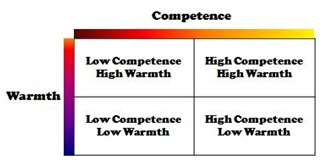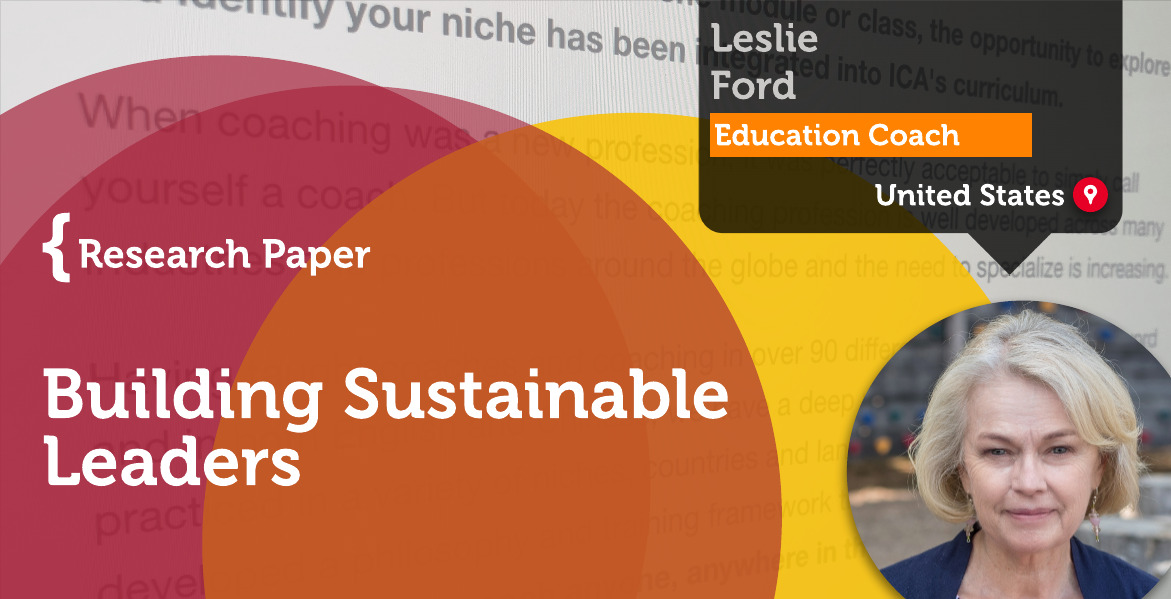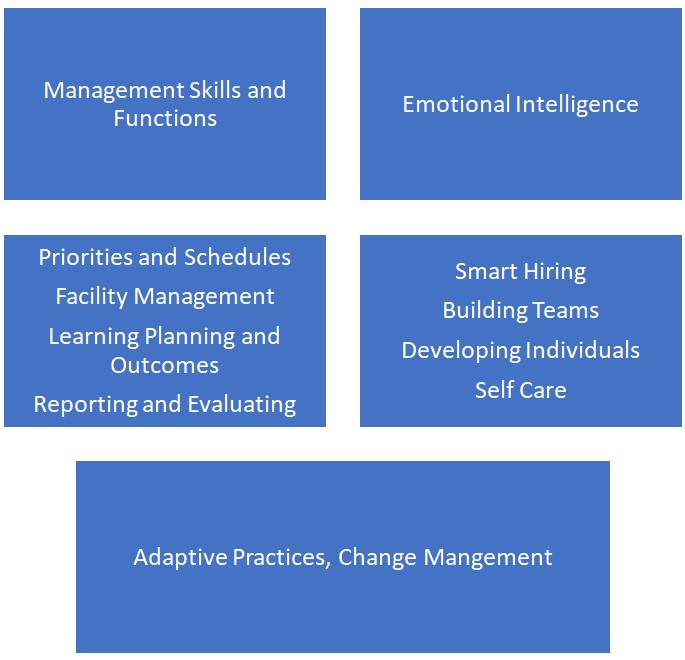A Research Paper By Leslie Ford, Education Coach, UNITED STATES
Targeted Coaching Strategies for Building Sustainable Leaders
Leaders in education are hired for their skills, their energy, and their expertise. What gets them fired can be their inability to develop strong emotional intelligence skills that bring people together and drive initiatives forward. Coaching is the strongest strategy to develop adaptive, flexible leaders.
In the chapter, The Arrow of Time: Restoring Sanity, sociologist Margaret Wheatley addresses the timeliness of preparation for all of us as leaders. “It is easy, although painful, to observe the decay and degradation of the human spirit and our planet at the global, national, and local levels. But what’s going on in our organizations? How can we assess our health versus our decay? As we attempt to fortify ourselves with sanity rather than fear, to open rather than close, what requires our attention?”She offers five areas of focus for our thoughtful review: quality of relationships, fear versus love, quality of thinking, willingness to contribute, and the role of money.
In its publication, Navigating the Future of Learning: A Strategy Guide, Knowledgeworks identified five drivers of change and opportunity predicted to influence the cognitive, social, ethical, and institutional environment of learning:
| Five Opportunities to Build Effective Strategies | Five Drivers of Change |
| Civic engagement for the smart age | Automating choices |
| A learning lifestyle | Civic superpowers |
| Systemic interdependence | Accelerating brains |
| Smart technologies for all | Toxic narratives |
| Many selves, many stores | Remaking geographies |
The challenge is to work with these levers of change and opportunity preparing learning communities to be redefined and thrive in a world of complexity and uncertainty. We are living through an example of complexity and uncertainty as we come to terms with the COVID-19 virus, a fitting sandbox to apply adaptive thinking.
Successful scenarios in these potential future circumstances will all require the need to develop staff as individuals and a community. Building productive professional relationships in teams, committees, and schools all require an understanding of emotional intelligence and personal strengths. These factors provide a context for the importance of supporting emerging leaders in education with one of the most powerful change tools available: coaching.
Building Sustainable Leaders Explanation
Coaching could be seen as a vessel created from time and space where individuals can explore their own ideas, assumptions, biases, and fears with honest self-reflection and examination with a nonjudgmental coach actively listening and open to the possibility of development in the client. Educators promoted from school roles such as content or grade level teacher may arrive at leadership positions with an elevated opinion of their ability to influence their success in new, more diverse roles that include management and leadership deliverables. Principals and Superintendents supervise a wide variety of positions, organize teams and committees, oversee regulation and policy, and answer to annual improvement goals.
Below is a distilled model of the two sides of leadership: managing operational issues and projects, and leading people by employing the skills of emotional intelligence. When both sides of leadership are developed there is a higher probability of adaptive behavior in the school and openness to change. It is more likely that initiatives that take several years to develop will stick and continue regardless of personnel shifts.
Definition:
Management Functions and Skills -The planning and organization of resources to move a specific task, event, or duty toward completion
Emotional Intelligence –Ability to identify, assess, and control the emotions of oneself, others, and groups
Someone may be noticed and promoted to the role of leader in a school district due to their ability to manage resources, tasks, and deadlines. But they can only fully assume the role of leader when they are actively involved in identifying, assessing, and working with the emotions of themselves and others as they continue to interrelate. This is complicated, as leaders in these roles commonly field criticism from a variety of stakeholders, but seldom if ever receive feedback about their growth and development from peers. Evaluation systems slanted toward outcomes may miss the important role of managing and developing professionals around you. Coaching for leadership, while accounting for the management skills necessary for the role, is intended to broaden the career pipeline of leadership for districts with a commitment to sustaining school cultures that supports leadership at several levels.
Coaching Model

Emotional IQ can be measured by something as simple as a warmth factor. Indicators of warmth, such as social conversations, appropriate gestures, smiles, and casual laughter build comfort and trust in working relationships. The matrix points out the difficulty when technical competence or “getting the job done” happens at the expense of developing warmth in ongoing relationships.
Emotional intelligence, identified in research and then refined by Howard Gardner to Daniel Goleman, can be defined as “the capacity for recognizing our own feelings and those of others, for motivating ourselves, and for managing emotions in ourselves and others”. These skills directly relate to the ability to communicate, collaborate, lead and manage the work of others found in a building and district. They create environments that inspire and sustain employees and link directly to students’ academic achievement in their schools.
As an administrator in a building or leading a district, everyone is a part of your team. Managing the behaviors, actions, and goals of those team members requires awareness, the ability to assess situations and apply remedies, and continuous attention to the wellbeing, growth, and interaction of all involved. Leaders and engaged team members contribute to the environment for success, two-directional feedback, and conflict management strategies. The table is a breakdown of the ways in which emotional intelligence can show up during the coaching process. The coach who is aware of these areas can help their client dig below the presenting issue for those themes that will provide meaningful reflection and growth to their client:
| Recognition | Regulation | |
| Personal Competence |
Self-Awareness
|
Self-Management
|
| Social Competence |
Social Awareness
|
Relationship Management
|
Leadership and Emotional Intelligence Coaching Structure
| Initial phase: Coaching Mindset | Check-in with the mental and emotional state of client Importance of potential goal, benefit to self, others |
| Establishing the Agreement: | Seek clarity and direction for the goal Explore the goal and potential emotional content Ask about uncertainty, feelings, perceptions Weigh the emotional consequences of meeting, or not meeting the goal for the client Attend to building management skills and behaviors Establish measures of success |
| Exploration, Active Listening | Use metaphor or symbol Link to feelings in the body Notice anything blocking the client Pay attention to energy shifts Adjust measures of success as the client dives into the goal Mirror areas of personal, and social competence Summarize skill development and steps Reflect on impact, the benefit of choice |
| Client Growth |
Measure movement from the start of the session to now |
Master Coach Fran Fisher outlined a model that strengthens the emotional intelligence of clients that she termed “transformational coaching”. Her aim of moving clients to empowerment applies equally to developing the emotional savvy of leaders. The key lies in focusing on the “Who” questions centered internally for each client. Coaching with an emphasis on emotional intelligence will have the client returning in cycles to issues relating to their own perceptions, ability, and influence. These are the Who questions in coaching vernacular. Here are some examples:
- What is important to you about this issue?
- How will you benefit when you have this?
- What will it look or feel like if you achieve this?
- What will be most helpful at this point?
- What’s the real challenge here for you?
- What have you done or worked on?
- What contributes to this situation?
- And what else?
- Where do you see yourself in this goal?
- What is the feeling, metaphor, or symbol this makes you think of?
- What does an ideal situation look like?
- What will be different now you know this?
- What can you do starting today?
- What might get in the way of accomplishing this?
- With this action, who will be involved?
- What will you use to measure your progress?
- What have you noticed?
- What has become clearer to you?
- What new awareness will you take away from this session?
- What will you need in place to ensure you do the things related to your goal?
- As you sit with this plan, what is telling you it will be successful?
Emotional intelligence empowers leaders. Educational leaders with high levels of emotional intelligence influence their staff and positively impact student achievement. The four domains of emotional intelligence established by Goleman detailed through 19 competencies illustrate the wide reach a skilled leader has to change and manage an organization positively.
Using the model of a coaching structure designed to build management skills and functions while simultaneously supporting the continuous development of the use of emotionally intelligent strategies is a powerful coaching tool for leaders seeking growth for themselves, their staff, and their schools.
| SELF | OTHERS | ||
| Self – Awareness | Self – Monitoring | Social Awareness | Managing Relationships |
|
Emotional Self Awareness |
Self- Control |
Empathy Service Orientation Organizational Awareness |
Developing Others Influence Communication Conflict Management Leadership/ Change Catalyst Building Bonds Teamwork and Collaboration |
References
An Everyone Culture: Becoming a Deliberately Developmental Organization, R. Keegan, L. Laskow Lahey, Harvard Business School Publishing, 2016
Career Coaching: Coaching for Change, R. Boyatzis, M. Smith, E. Van Oosten, Harvard Business Review, September-October 2019
The Cycle of Leadership: Surviving and thriving in today’s schools; S. Uebbing, M. Ford, Leaning Forward, 2011
Emotional Intelligence: An Essential Leadership Trait for Educators; Robert Tency, Vol. 4, Issue 1; Old Dominion University, The William & Mary Educational Review, 12.1.2016.
Evaluating the effectiveness of executive coaching: Where are we now and where do we need to be?; Australian Psychologist, December 2007:424) 310-318;Dr. Doug MacKie
Knowledge works Forecast 5.0 – The Future of Learning: Navigating the Future of Learning
Masterful Coaching, Third Edition, R. Hargrove, John Wiley & Sons, Inc., 2008
The Practice of Adaptive Leadership: Tools and Tactics for Changing Your Organization and the World, R, Heifitz, A, Grashow, M. Linsky, Harvard Business Press, 2009
The Project Management Tool Kit: 100 Tips and Techniques for getting the job done right; T. Kendrick, 2010, AMACOM
7 Key Tools for Coaching Your Management Team in 2022, L. Rudy, April 17, 2014
10 Trends that Will Impact the Future of Coaching; Coach Training World, June 26, 2019
Top 5 Major Coaching Models Every Coach Should Know, June 1, 2020, Staff Writers
Transformational Questions, From “What” to “Who”, F. Fisher, 2016. Frafishercoach.com
What Got You Here Won’t Get You There, M. Goldsmith, Hyperion Books, 2007
Who Do We Choose to Be? Facing Reality, Claiming Leadership, Restoring Sanity, M. J. Wheatley, Berrett-Koehler Publishers, Inc., 2017

